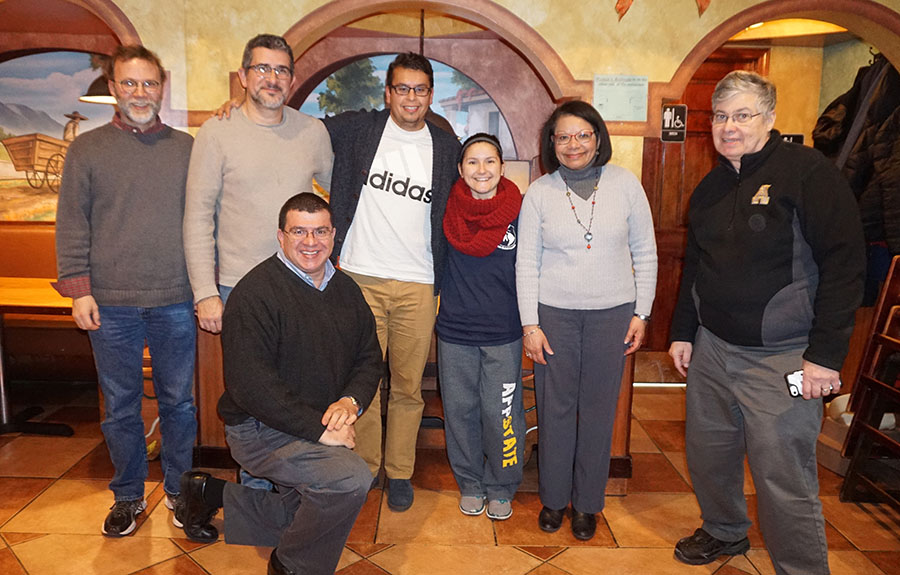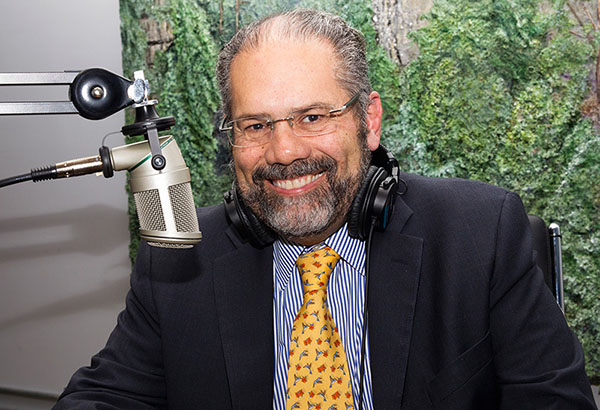
Founding members of Appalachian@s Hispanic/Latino Faculty and Staff Association include faculty and staff with various family backgrounds in Central and South America. Pictured from left to right are Dr. René Harder Horst, Dr. Rwany Sibaja, Dr. Garner Dewey, Marco Fonseca, Aneisy Cardó, Dr. Claudia Cartaya-Marin and Dr. John Craft. Photo submitted
BOONE, N.C. — Appalachian@s Hispanic/Latino Faculty and Staff Association has received official recognition as an employee organization of Appalachian State University and welcomes new members and participants in its activities.
The organization is dedicated to issues of importance to the Hispanic/Latino community on campus and in the local and state communities, while providing a networking opportunity for colleagues.
“Hispanics and Latinos are the fastest growing population in the state and on our campus, and as professionals at Appalachian, we wanted to offer our service and support for students and educate others on what it means to be Hispanic,” said Marco Fonseca, academic coordinator for Appalachian’s Upward Bound program, who serves as the group’s president.
“Our presence can show students and others they can achieve what we’ve achieved and more,” said Fonseca, who earned a bachelor’s degree from Appalachian in 2011 as well as a master’s degree in 2015.
Appalachian@s Hispanic/Latino Faculty and Staff Association received formal recognition in the fall semester of 2017. However, its members have been active leaders in events related to the Hispanic/Latino community for many years, including hosting the 4th Annual UNC Hispanic/Latino Forum on Appalachian’s campus in 2015, which included a public address by veteran broadcast journalist Ray Suarez.
The organization joins existing faculty/staff groups such as the Black Faculty and Staff Association, Faculty/Staff Christian Fellowship, Women’s Club and Still Point contemplative collaborative.
The mission of the Appalachian@s Hispanic/Latino Faculty and Staff Association includes:
- Promoting a sense of community.
- Addressing quality of life issues.
- Developing leadership skills.
- Supporting mastery of the Spanish and Portuguese languages.
- Encouraging effective teaching practices.
- Serving as translators in the community.
- Supporting research by and related to the Hispanic/Latino community.
The organization plans to collaborate with the Hispanic Student Association and local community groups serving the Hispanic/Latino population.
Chief Diversity Officer Willie C. Fleming said the affinity group’s presence will assist in Appalachian’s efforts to recruit and retain underrepresented students, faculty and staff.
“I am excited about this outstanding group of educators organizing in such a manner that will make Appalachian a more inclusively excellent campus,” he said.
Fleming added that research shows a positive relationship between the visibility of ethnic role models and the educational success of students of that ethnicity. “In addition to Latino/Hispanic students having access to role models and mentors, our general population has the opportunity to witness inclusive excellence from these highly respected leaders who will increase culturally diverse learning opportunities for the campus community,” he said.
Founding members of Appalachian@s Hispanic/Latino Faculty and Staff Association are Dr. John Craft, professor, Department of Art; Dr. Claudia Cartaya-Marin, chair, Department of Chemistry; Dr. Garner Dewey, associate dean, College of Fine and Applied Arts; Dr. René Harder Horst, professor, Department of History; Dr. Rwany Sibaja, assistant professor, Department of History; Marco Fonseca, academic coordinator, College Access Partnerships; and Aneisy Cardó, assistant director, Office of Admissions.
For more information about Appalachian@s Hispanic/Latino Faculty and Staff Association, visit https://appalachianos.appstate.edu or contact Marco Fonseca at [email protected]
Related link
About Appalachian State University
As a premier public institution, Appalachian State University prepares students to lead purposeful lives. App State is one of 17 campuses in the University of North Carolina System, with a national reputation for innovative teaching and opening access to a high-quality, cost-effective education. The university enrolls more than 21,000 students, has a low student-to-faculty ratio and offers more than 150 undergraduate and 80 graduate majors at its Boone and Hickory campuses and through App State Online. Learn more at https://www.appstate.edu.
What do you think?
Share your feedback on this story.




![How NCInnovation Is Rethinking Economic Development in North Carolina [faculty featured]](/_images/_posts/2026/02/rethinking-economic-development-600x400.jpg)







